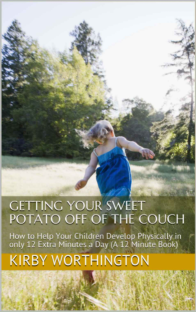A Healthy Way To Affirm
 Today’s post is a follow-up to last week's article on If you want your children to grow as they should, give less attention for bad, point out the good. As Kirby was reading George MacDonald’s book The Lost Princess this week, a few things came to mind about pointing out the good in our children. In fact, she would highly recommend the book as it brings to light the importance of humility as well as distinguishing between self-esteem and conceit. So today we’ll be mentioning a few take-aways she had as a child-development specialist reflecting on that story.
Today’s post is a follow-up to last week's article on If you want your children to grow as they should, give less attention for bad, point out the good. As Kirby was reading George MacDonald’s book The Lost Princess this week, a few things came to mind about pointing out the good in our children. In fact, she would highly recommend the book as it brings to light the importance of humility as well as distinguishing between self-esteem and conceit. So today we’ll be mentioning a few take-aways she had as a child-development specialist reflecting on that story.
Point Out the Good
First of all, when pointing out the good in our children, we need to be sure we point out what is true. If a little one is experimenting with art, we might be tempted to say, “This is the best art I’ve ever seen!” But that is most likely an untruth. Rather, we could say something like: “Wow, look what fun you’re having!” The child may be gifted, but they have room to grow. Giving them the truth will enable them to grow in their talents and pursuits.
Speaking about helping our children grow by pointing out positives, it is easy to only encourage a child’s raw talent or ability (be it singing, sports, whatever). But focusing only on natural talent does not encourage hard work as well, which is essential for developing their raw talents. Pointing out the good, therefore, might include drawing attention to their ability to sing or run (or whatever) – as long as that’s honest – while also encouraging them to grow and get better by praising their efforts as they try hard.
(If hard work is not encouraged, those children who choose to stick with natural talent alone may find that their abilities have been surpassed by others by the time they reach high school. These others may have worked at the skill, practicing and honing their talent. We aren’t saying that everyone needs to be pursuing the Olympics or making their child a Monet, of course. It is simply to say that we can help stimulate whatever gifts they do have by seeking to develop them further through an honest encouragement of the talent and effort.)
Secondly, when pointing out the good in our children, the way that we phrase our encouragement can mean the difference between an entitled or conceited child, on the one hand, and a child that is truly grateful for their abilities. The way we point out the good will have a tremendous effect on how they view themselves. “You worked so hard at that, and look! Isn’t it good to stick with it and see what can come of it?!” The important thing is to encourage any good character quality you see in your children, whether it be generosity, kindness, leadership (not bossy-ness), etc.
Give Less Attention for Bad
What about paying less attention to the bad? According to Kirby, research shows that when you ignore bad behavior – as long as it isn’t hurting self, others, or things – and when you quickly sidetrack them to something else, then a lot of times it won’t take long before the behavior simply goes away.
Children are going to make many mistakes every day because they are children. We can’t train them in all things at once. So rather than pointing out or trying to address every mistake, pick one area or two that you can focus on for a set time (a day, week, or month – whatever it takes, whether long or short). Take time to think about this decision. Be intentional in what you choose to focus on – you know your child.
A Game for Pointing Out the Good
One way to point out the good in a helpful way is a little game Kirby has played with her children and grandchildren. In fact, the basic point can really be done for anyone you care about. This is to be done when you have your child alone. Stand them in front of you and say, “If I could choose any ___ year old in the whole world to be my own ___ year old…” Then pretend that all the ___ year olds are in a line with your child down the line a bit. Start going down the line a little ways before them, saying to first imaginary ___ year old: “You’re wonderful, but I’m looking for a ___ year old who shares well.” Moving on to the next pretend child in line: “Oh, you’re lovely, but I’m looking for one who is trying hard to be kind.” And so on. Go down the line naming precious character qualities that your child possesses or is specifically working on. Finally, when you come to your child say something along the lines of: “Oh! This is the one! This is exactly who I’ve been looking for! Will you be my ___ year old?!” (Swooping them into your arms and celebrating that he or she is “now” your child is a nice touch.)
(Remember two things as you play this: Don’t make up something good about them that is untrue. [See above.] And don’t use this time to point out bad things in a subtle way. You know, like if your little tyke is terrible at patience and you say, “I’m looking for a ___ year old who is very patient”! This is supposed to be a game that encourages their present good traits.)
This is a lovely way to end a rough day with your child, or to start a brand new day! We can do this basic idea for each other, and even for ourselves. Maybe not the game as such, but the principle. When we focus solely on the ways in which we or someone else is failing, it feeds a downward spiral. But there is great power in choosing to focus on what we’re thankful for instead. “If you want your children to grow as they should, give less attention for bad, point out the good.”
Photo Credit: Apps for Good cc
By accepting you will be accessing a service provided by a third-party external to https://mail.growthandgiggles.com/

